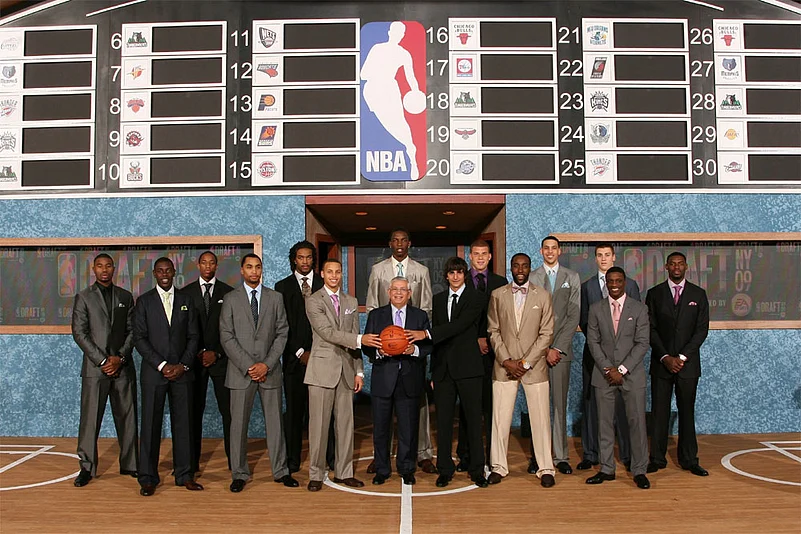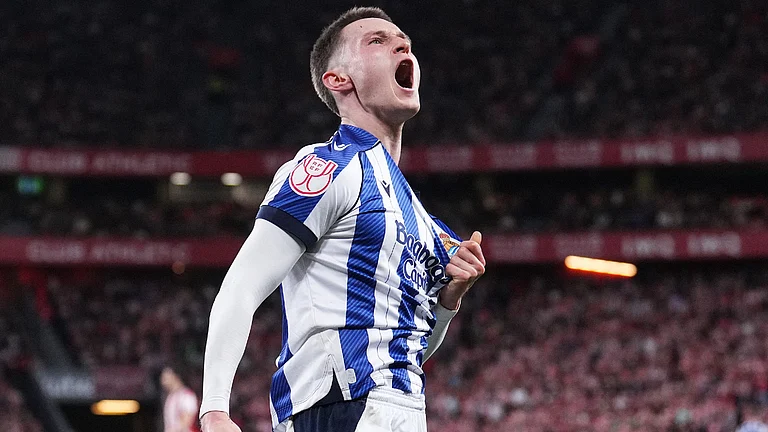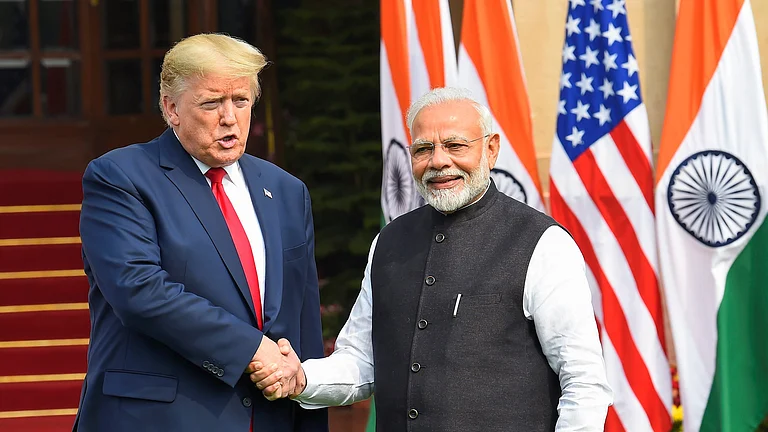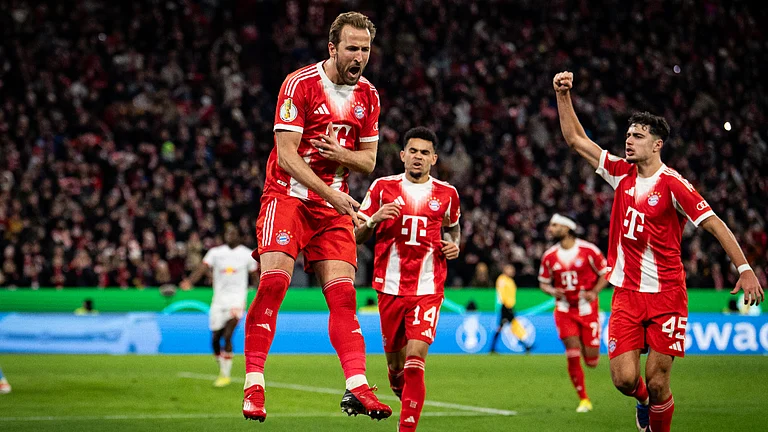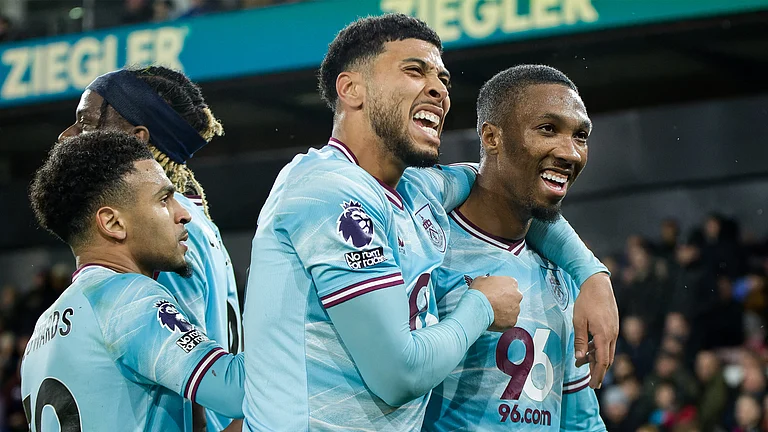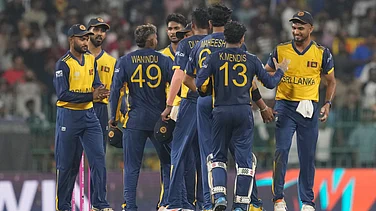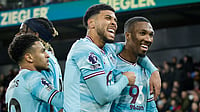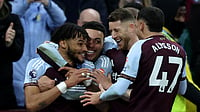At this time a year ago, most NBA teams were right around the 10-game mark.
The Los Angeles Lakers, who would capture the season's delayed championship a mere 11 months later, sat atop the Western Conference at 8-2, while defending conference champions and injury-ravaged Golden State Warriors were tied with the lowly New York Knicks for the league's worst record at 2-9. (More Sports News)
Fast-forward a year, and the NBA is in the midst of an offseason, albeit a brief one. The 2019-20 season ended on October 11, and just this week the NBA made it official that the 2020-21 campaign will tip off on December 22.
The draft had been scheduled for October 16 before being pushed back to next Wednesday, when it will take place virtually from the ESPN headquarters in Bristol, Connecticut.
The draft order was set back on August 20, when the league conducted its lottery at the NBA office in Secaucus, New Jersey, revealing the Minnesota Timberwolves have the top selection and the Boston Celtics have the last lottery pick – courtesy of the Memphis Grizzlies.
Most of these teams have not played a game since mid-March, so in case you have forgotten about how the league's also-rans fared – or tried to forget if you are a Knicks fan – here is a little breakdown of some notable stats from the teams with lottery picks.
1. Minnesota Timberwolves
For the second time in franchise history the Timberwolves have the top overall pick. The only other time they picked first was in 2015, when they selected Karl-Anthony Towns out of Kentucky. Towns led the Timberwolves last season with 26.5 points per game, while D'Angelo Russell averaged 21.7 and Malik Beasley averaged 20.7. The Timberwolves and the Celtics were the only two teams last season to have three players average 20 or points (minimum 12 games played). Minnesota could have possibly had more 20-point players if they could have made a higher rate of their shots. Minnesota were third in the league in three-point attempts per game (39.7) but were the NBA's third-worst team in three-point shooting at 33.6 per cent to become just the third team in league history to rank in the top three in three-point attempts per game and third worst in three-point percentage, joining the 1999-2000 Sacramento Kings and 2003-04 New Orleans Hornets. While the offense struggled, Minnesota's defense were abysmal, allowing at least 100 points in each of their final 30 games. After the All-Star break, the Timberwolves' opponents' scoring average of 125.3 points and opponents' shooting percentage of 51.7 percent both ranked last in the league. Winning the lottery and picking first is usually a blessing, but without a clear-cut number one in this draft, Minnesota have some decisions to make with how they plan to bolster their roster.
2. Golden State Warriors
A year ago, the Warriors were picking 28th and now they are second. Times have certainly changed, but you would have probably noticed that already. Given the Warriors were without Stephen Curry and Klay Thompson for essentially the entire season, it is no big surprise Golden State's winning percentage from 2018-19 to 2019-20 dropped by .464 – the biggest decline by any team from one season to the next since the Cleveland Cavaliers' drop in winning percentage of .512 from 2009-10 to 2010-11. Offensively, Golden State finished last in the NBA in effective field goal shooting at 49.7 per cent - (FGM plus 0.5 three points made)/FGA – and last in points scored per 100 possessions at 102.9. Eric Paschall led the depleted Warriors in scoring with 837 points – the lowest by any team leader in 2019-20. As Golden State's scoring leader, Paschall became the first Warrior rookie to lead the team in scoring since Hall of Famer Rick Barry in 1965-66. With Curry and Thompson healthy, the offense will have an entirely different look for 2020-21 and get Golden State back among the upper echelon of teams. The Warriors now seem to be targeting Memphis big man James Wiseman to upgrade a defense that allowed 110.9 points per 100 possessions – tied with the San Antonio Spurs for the fifth worst in the NBA.
3. Charlotte Hornets
After a lacklustre offensive showing in 2019-20, the Hornets are picking third for the first time since taking Gonzaga's Adam Morrison in 2006. While the NBA scoring average was at 111.8 points per game, Charlotte averaged a league-low 102.9 points and shot a league-worst 43.4 per cent – the first team since the 2015-16 Lakers to finish last in both categories. They shot a league-worst 33.4 per cent on pull-up shots and even right at the rim they struggled to convert, recording a league-worst 56.6 per cent on dunks and layups. In their 65 games played last season, they were outshot in 48 of them – the most in the league. You get the picture, the Hornets need to improve their shooting.
4. Chicago Bulls
The Bulls are the only team to rank in the bottom five in scoring each of the last three seasons. They concluded the 2019-20 campaign with the NBA's fourth-worst scoring offense at 106.8 points per game and the fourth-worst offensive rating at 104.1 points per 100 possessions. They were the fifth-worst shooting team on catch and shoots at 35.7 per cent and sixth worst at converting dunks and layups at 58.4 percent. Not only were the Bulls not much of threat offensively, they were a mess on the glass, averaging the second-fewest rebounds in the NBA at 41.9 per game – the franchise's fewest since averaging 40.0 in 2001-02. Upgrading the offense with a proven shooter could be the way new executive vice president of basketball operations Arturas Karnisovas leans.
5. Cleveland Cavaliers
Defense was somewhat optional for the Cavaliers last season, and they essentially opted not to play it, ranking last in the NBA in points allowed per 100 possessions at 113.6. Since the advent of the three-point line in 1979-80, their opponents' effective field goal percentage of 56.0 was the second worst by any team in a season beating out only the 2018-19 Cavs' 56.4. Their offensive production was not much better, with their 104.4 points per 100 possessions ranking sixth worst in the NBA. Carelessness played a part in Cleveland's inefficient offense with their 16.5 turnovers per game ranking last in the league – the first time since 1997-98 they finished last in turnovers per game. The Cavs enter this draft with plenty of needs on both sides of the ball.
6. Atlanta Hawks
The Hawks had glaring issues both offensively and defensively last season, posting the fifth-worst offensive rating at 104.3 points per 100 possessions, along with the third-worst defensive rating at 112.3 opponents' points per 100 possessions. Their defense was especially shoddy down the stretch, permitting a league-worst 124.3 points per game since February 1. Their offensive woes, meanwhile, stemmed from poor perimeter shooting, as they ranked last in the league in three-point shooting at 33.3 per cent – the first time since 2006-07 they had the NBA's worst three-point percentage. Finding someone to compliment Trae Young would go a long way in boosting the offense. Young averaged a team-high 29.6 points while the Hawks' second-leading scorer, De'Andre Hunter, averaged 12.3 points. That difference of 17.3 points per game was the largest gap in the NBA between a team's leading scorer and its second-leading scorer.
7. Detroit Pistons
Perhaps the biggest issue for the Pistons last season was that the oft-injured Derrick Rose led the team in scoring – not exactly the ideal player a team want to build around given his age and inability to stay healthy. Rose's average of 18.1 points per game was the second lowest for a team leader in 2019-20, and the Pistons had a 30-point scorer in just seven games – tied with the Miami Heat for the fewest 30-point games by a player last season. Detroit's offense was never flashy, averaging the fifth-fewest fast-break points per game at 11.0, and then it really shrivelled down the stretch, averaging a league-worst 103.7 points per 100 possessions after the end of January. Selecting a playmaker that can jump-start the offense should be Detroit's prime goal come draft night.
8. New York Knicks
Offense was not New York's strong suit last season. The Knicks had the league's worst true shooting percentage at 53.1 per cent and second-worst effective field goal percentage at 50.1. Not to be outdone, they also had the league's second-worst offensive rating at 103.8 points per 100 possessions. Behind power forward Julius Randle, the Knicks found success in scoring inside, scoring 46.9 percent of their points on dunks and layups – the seventh-highest rate in the NBA – but had the league's fourth-worst three-point percentage at 33.7. Upgrading at the point guard position, preferably with one who can score, is the troubled team's top priority.
9. Washington Wizards
Defense – or lack thereof – was the downfall of the 2019-20 Wizards, who surrendered 125 or more points in an NBA-worst 26 games. Washington were last in the NBA in opponents' true shooting percentage at 59.6 and had the league's second-worst defensive rating, allowing 112.7 points per 100 possessions. The team also had no answer on the boards, as they were outrebounded in an NBA-worst 50 games. Bradley Beal, meanwhile, carried the offense, leading the team in scoring in 46 games last season – two fewer than Giannis Antetokounmpo led the Milwaukee Bucks outright in scoring for the most in the NBA. Led by Beal, the Wizards reached the 115-point mark in 34 games – eighth most in the NBA - but their .500 winning percentage (17-17) in games scoring 115 points or more was tied with the Timberwolves (15-15) and Warriors (8-8) for the worst in the league. The all-out offensive attack does not seem to be working for the Wizards, so a defensive stopper may be the answer.
10. Phoenix Suns
The Suns were all business on their summer trip to "The Most Magical Place on Earth," but still missed the playoffs for a 10th straight season – the second-longest active playoff drought behind the Sacramento Kings at 14. Phoenix are seemingly a playoff-calibre team, at least it looked that way at Walt Disney World Resort, where they won all eight of their games in the restart to become the first team in NBA history to end the regular season on an eight-game winning streak and still miss the playoffs. The Suns averaged 122.3 points and shot 40.2 per cent from three-point range in Orlando after averaging 112.6 points while shooting 35.3 per cent from beyond the arc before the season went on pause. Prior to the restart, the Suns were tied with the Cavs for 20th in the NBA in three-pointers made per game at 11.2, so adding a wing that can connect from long range would help. What would also help would be capturing that magic the team displayed inside the Orlando bubble and playing with that intensity from the get-go instead of waiting until the last two weeks.
11. San Antonio Spurs
With the 11th pick of the draft, the Spurs have a lottery pick for the first time since drafting Tim Duncan first overall in 1997. That is what happens when the team misses the playoffs for the first time in 23 years. San Antonio had some success offensively last season, ranking fourth in three-point shooting at 37.6 per cent. The problem was only the Knicks attempted fewer three-pointers, so Gregg Popovich was not buying into the chuck up three-pointer offense. The offense, however, neglected to force the ball inside, attempting a league-low 27.6 percent of their shots on dunks and layups. Instead, San Antonio attempted an NBA-high 70.4 per cent of their shots on jumpers. Popovich's defense also was not up to normal standard last season, allowing 110.9 points per 100 possessions - tied with the Warriors for the fifth worst in the NBA. While the defense could be improved, upgrading the offense with a playmaker is paramount.
12. Sacramento Kings
The Kings may be owners of the longest active playoff drought at 14 years, but their trajectory is pointing in the right direction with an offense revolving around De'Aaron Fox and Buddy Hield. Since the start of February, Sacramento ranked seventh in three-point shooting at 38.0 per cent and 10th in scoring at 115.6 points per game. The problems begin with their lack of size and athleticism in the interior. The Kings were the fourth-worst rebounding team, averaging 42.6 boards, and fourth worst in blocking shots, averaging 4.07. Opponents also shot 64.9 per cent within five feet of the rim – the second-highest field goal percentage in the league. Finding a rim protector could be the difference in the Kings reaching the playoffs for the first time since 2006.
13. New Orleans Pelicans
Like the Kings, the Pelicans have a solid young core behind Zion Williamson, Brandon Ingram and Lonzo Ball and are on the precipice of becoming a playoff team. Last season, they ranked seventh in three-point shooting at 37.0 per cent, fifth in three-pointers made per game at 13.6 and fifth in scoring at 115.8 points per game. However, they also ranked 17th in offensive rating at 108.0 points per 100 possessions after ranking 29th in turnovers per game with an average of 16.4. Their defense also left something to be desired, especially in the restart, where their opponents' average of 113.4 points per 100 possessions was tied with the Brooklyn Nets for the fifth worst from the eight seeding games. The defense should see improvement under new coach Stan Van Gundy and drafting a big man that can step out to draw opposing defenses away from Williamson will make the offense more dangerous.
14. Boston Celtics
Eight weeks after playing in the Eastern Conference Finals, the Boston Celtics own a lottery pick via a trade with the Grizzlies from five years ago. Boston are the only team with three first-round picks, so for a team with a championship window wide open it seems unlikely they will keep all of them. The Celtics ranked second in three-point defense last season at 34.0 per cent and fourth in defensive rating at 104.5 points per 100 possessions. They were also tied with the Spurs for fifth in offensive rating at 110.4 points per 100 possessions and will bring back most of their roster, so they do not have a lot of big-time needs. More depth would certainly be welcome, however, after Boston's reserves accounted for just 25.0 percent of the team's total points – the third-lowest percentage of bench points in the NBA.






